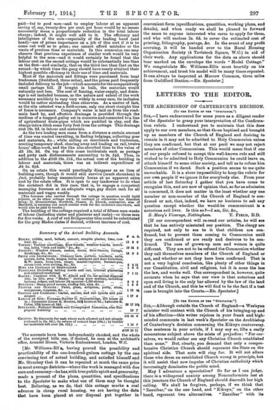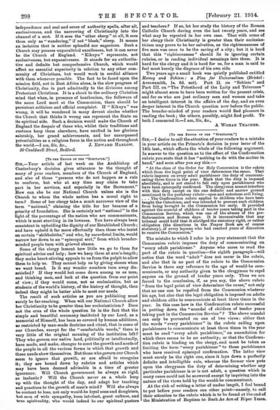[TO TIM Emma ow vas °Brume:roan SI11,—Although outside the Church
of England—a Wesleyan minister well content with the Church of his bringing-up and of his affection—this writer rejoices in your frank and high- minded comments in last week's Spectator on the Archbishop of Canterbury's decision concerning the Kikuyu controversy. One sentence in your article, if I may say so, lifts a really momentous subject above the mists of prejudice: "For our- selves, we would rather see any Christian Church established than none." But, clearly, you demand that only a compre- hensive Christian Church should represent the State on the spiritual side. That note will ring far. It will not allure those who deem an established Church wrong in principle, but it will assist that new impulse of Christian catholicity which increasingly dominates the public mind. May I adventure a speculation? So far as I can judge, there is a widespread anxiety among Nonconformists lest at this juncture the Church of England should discredit her high calling. We shall be forgiven, perhaps, if we think that "Zanzibar," on the one band, and "Kikuyu," on the other hand, represent two alternatives. "Zanzibar" with it.
independence and zeal and sense of authority spells, after all, exclusiveness, and the narrowing of Christianity into the channel of a sect. If it sees the "other sheep" at all, It sees them only as "wandering," if not " black," sheep. It means an isolation that is neither splendid nor sagacious. Such a Church may possess unparalleled excellences, but it can never be the Church of England. "Kikuyu" represents, not exclusiveness, but expansiveness. It stands for an authorita- tive and definite but comprehensive Church, which would affect no essential superiority in relation to any other com- munity of Christians, but would work in cordial alliance with them whenever possible. The fact to be faced upon the mission field, not in East Africa alone, is the slow progress of Christianity, due in part admittedly to the divisions among Protestant Christians. It is a shock to the ordinary Christian mind that when, in presence of heathenism, the followers of the same Lord meet at the Communion, there should be persistent criticism and official complaint. If "Kikuyu" was wrong, it will be wondered in many devout circles whether the Chnrch that thinks it wrong can represent the State on its spiritual side. Such a decision would make the Church of England the despair of those who, whilst their traditions and customs keep them elsewhere, have exulted in her glorious saiutsbip, her grand achievements, and her unsurpassed potentialities as a religious force in the nation and throughout















































 Previous page
Previous page